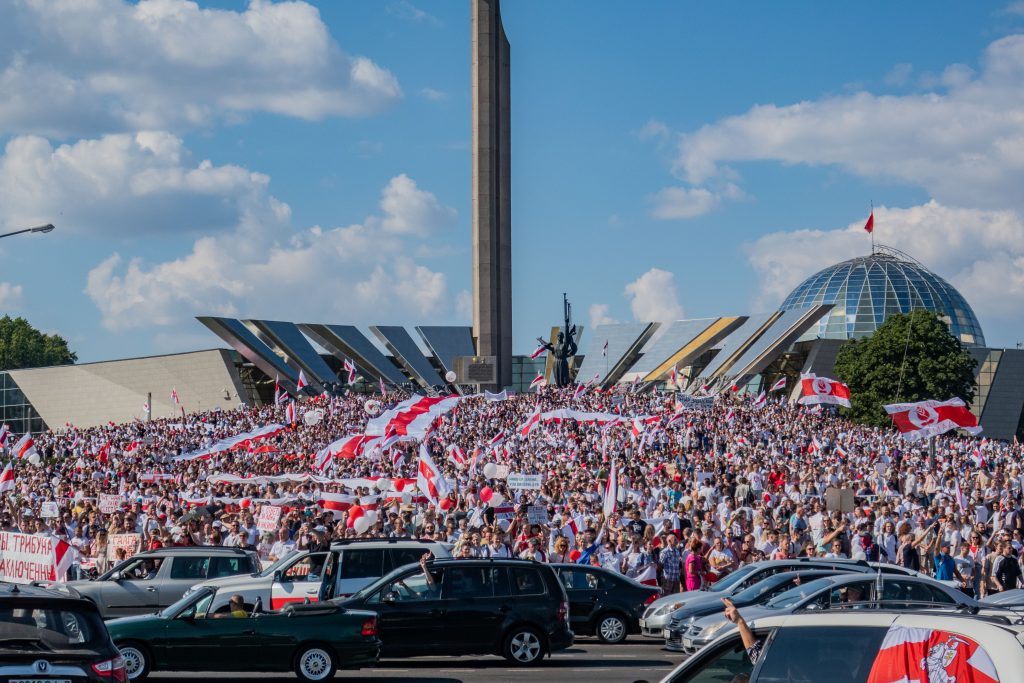More than a month has passed since the brazenly falsified official results of the August 9 presidential election in Belarus showed incumbent president Aliaksandr Lukashenka winning eighty percent of the vote. The sham prompted hundreds of thousands of Belarusians across the country, from the largest cities to the smallest villages, to take to the streets. Despite the regime’s widespread use of violence and intimidation against these protesters, the demonstrations show no signs of abating. As a scholar of Eastern European history and politics based in Austria, I have been struck by the determination of the protesters and by the opportunity for those of us outside Belarus to match their moral clarity. The international community’s response—on both the diplomatic and grassroots levels—will play a crucial role in how the situation will develop as the protests enter their second month.
Civic courage
The election and subsequent protests have brought together a broad, diverse coalition united by a refusal to tolerate the Lukashenka regime. Though the long-serving president, first elected in 1994, enjoyed the support of a majority of the population for much of his time in office, in the months before the 2020 election unofficial opinion polling (independent polling is banned in Belarus) revealed a consensus that it was time for him to go. Economic stagnation and political authoritarianism, compounded by mishandling of the COVID-19 pandemic, brought many Belarusian voters to breaking point.
The regime’s actions in the lead-up to the election only strengthened this conviction. Lukashenka’s three main opponents were ruled ineligible. Two were arrested on politicized charges, while the other fled to Russia to avoid arrest. In response, the three opponents’ camps united behind Sviatlana Tsikhanouskaya, the wife of one of the arrested men. Tsikhanouskaya’s electoral platform was clear: her sole goal, if elected, was to hold new, fair elections. This goal held broad appeal, and her campaign rallies were among the largest public gatherings in Belarus since the country became independent in 1991. When official election results claimed that Lukashenka had received more than eighty percent of the vote—an obvious fabrication—protests broke out immediately, calling for Lukashenka to resign.
On many outsiders’ mental maps of Europe, Belarus is something of a black hole between the EU and Russia.
In subsequent weeks, demonstrations across the country have brought hundreds of thousands of Belarusians, many of whom had previously avoided political engagement of any sort, into the streets. State employees went on strike; university students staged protests on the first day of the new semester; and women of all ages, dressed in white and holding flowers, gathered repeatedly, despite the fact that previous women’s protests had ended in mass arrests and police violence.
The regime’s response to all these forms of protest has been brutal. As detailed in a disturbing, extensive report from Human Rights Watch, thousands have been detained for 72 hours, the maximum allowed without a court hearing under Belarusian law, and many of them report being tortured during their detention. Other protesters’ whereabouts remain unknown. In addition, state security forces use brutal methods to break up protests, including beating random individuals. Truly striking is the indiscriminate nature of the violence being inflicted by the police—no one is exempt, from students to elderly women to journalists observing the protests.
Yet despite the real danger facing protesters, they have not been deterred. The crowds are not shrinking after more than forty straight days of demonstrations. For now, Lukashenka has dug in his heels and has no intention of going anywhere. When speculating on how the protesters might ultimately succeed, analysts and media point to the necessity of international pressure on the Belarusian president—but how realistic is that?
The world responds: geopolitical bias
That the August 9 elections were “neither free nor fair,” as the European Council’s August 19 official statement put it, has been widely acknowledged by governments across the globe. Expressions of concern over the election falsification and especially the regime’s subsequent treatment of protesters have come from many quarters. Still, it’s one thing to voice objections to the Belarusian regime’s conduct; implementing measures to put pressure on Lukashenka or to support the protesters is quite another. To date, with few exceptions, the international community has confined itself to the former.
A key source of this inaction is the geopolitical prism through which Belarusian politics are understood. On many outsiders’ mental maps of Europe, Belarus is something of a black hole between the EU and Russia. Even more so than its neighbor to the south, Ukraine, to which it is frequently compared, Belarus is understood as little more than a Russian satellite.
To be sure, Belarus is both politically and historically entangled with Russia, but the present-day relationship between the two countries is more complicated. Beginning with the 2008 Russo-Georgian war, and especially since the Russian annexation of Crimea and invasion of eastern Ukraine in 2014, Lukashenka has sought to balance Russia’s influence by cooperating with the West, the EU in particular, tacking back and forth between the two sides according to what he saw as politically expedient at any given moment.
More valuable than geopolitical calculation is international solidarity with the people of Belarus as they resist a tyrannical regime.
Nonetheless there is a common assumption that Lukashenka is basically a Russian puppet, and in many quarters, calculations of the appropriate response to Lukashenka’s behavior have focused far more on Russia’s potential reaction than on the egregious violence he is inflicting on his own citizens. To take just one striking example: at a press conference on August 19, German chancellor Angela Merkel addressed the protests in Belarus. While she confirmed that the EU would not recognize the results of the elections and condemned the Lukashenka regime’s behavior, her remarks quickly turned to Belarusians’ right to democracy free of foreign influence, rather than democracy free from electoral fraud and state-inflicted violence. That is, her concern stemmed more from Russia’s (potential) role than from the actual plight of the Belarusian population.
This is not to deny that the “Russia factor” matters. Lukashenka himself is fully aware that without at least the passive support of the Russian government, he cannot maintain his grip on power. (His obsequious language and behavior during his September 14 meeting with Russian president Vladimir Putin in Sochi made this abundantly clear.) But trying to predict how Russia will act is of limited value, given how many options are on the table. Putin could decide to lend Lukashenka a hand in suppressing the protests, for example, but he could just as easily decide that the Belarusian leader is one headache too many and turn his attention to what the next Belarusian government might look like. If Western leaders allow speculation over Russia’s plans to shape their response to the protests, they will miss a chance to show moral clarity and also deprive the people of Belarus of their own agency.
Choosing solidarity
Ultimately, more valuable than geopolitical calculation is international solidarity with the people of Belarus as they resist a tyrannical regime. This solidarity can take many forms, both diplomatic and grassroots.
On the official level, solidarity might mean using traditional diplomatic tools such as sanctions to undermine Lukashenka’s ability to repress the protests: if he has no means to pay the security services, the prospect of defections grows much more likely. The EU is likely to impose sanctions in the coming weeks, though the currently-rumored list of targets is smaller than would be necessary to have a real financial impact.
In the meantime, we have already seen other powerful forms of official solidarity, coming first and foremost from Belarus’s northern neighbor, Lithuania. It was to Lithuania that Tsikhanouskaya fled soon after the election for her own safety; since then, the Lithuanian parliament has passed a resolution recognizing her as the legally elected leader of Belarus.
Our demonstrations of solidarity can take the form of telling individual stories and amplifying Belarusian voices.
In another expression of solidarity, when word got out that Nobel Prize winning author Svetlana Alexievich, a member of the opposition’s Coordination Council, feared that state forces would soon descend on her apartment to arrest her, a group of ambassadors to Belarus from across the EU gathered at the author’s apartment. Photos quickly circulated on social media, a strong visual statement of support. This physical demonstration of solidarity seems to have sent the desired message to the regime: Alexievich is the only remaining member of the Council who has neither left the country nor been arrested.
For those of us who don’t hold public office, our demonstrations of solidarity can take the form of telling individual stories and amplifying Belarusian voices. At the Institute for Human Sciences in Vienna, for example, we have initiated a Chronicle from Belarus, where we are gathering and translating firsthand accounts, artistic responses to the protests, and essays and analysis from Belarusian authors. By shifting our attention away from the geopolitical level and instead focusing on the protesters themselves and listening carefully as they tell us what they are trying to achieve, we bring their agency back into the equation.
In the end, our solidarity must not stem from pity or horror, as horrifying as the state-inflicted violence may be. Instead, we should recognize the universal values that these protesters are insisting on—universal values like the dignity of the human person, the right to political self-determination, and the idea of a common good. Solidarity is a choice but not merely an “option”; indeed, as a global community, we are called to choose the only morally acceptable path forward. Those of us watching from outside Belarus have much to learn from the example of civic courage they have set. Over the past six weeks, the constant question has been “Will the protests succeed?” In one sense, they already have: the people of Belarus have made clear what they stand for. We are all called to follow their lead.
Katherine Younger, a historian of modern Eastern Europe, is research director of the Ukraine in European Dialogue project at the Institute for Human Sciences in Austria. She holds a PhD in Russian and East European History from Yale University, and participated in a September 3 flash panel on Belarus hosted by the Keough School’s Nanovic Institute for European Studies.
This article is part of a series of blog posts published by the Keough School of Global Affairs. Dignity and Development provides in-depth analysis of global challenges through the lens of integral human development.



